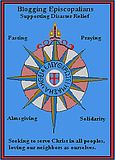trying to find words
I'm preaching at St. Patrick's, Broken Arrow, tomorrow. Always difficult to preach on disasters in one's own parish, let alone on the road.I'm posting my draft, for advice but also to contribute to those who, like me, are struggling with what we are all going to have to do tomorrow, step into the pulpit and share the Good News.
Proper 18
Ezekiel 33:7-11; Romans 12:9-21; Matthew 18:15-20
How do you preach when there are no words to describe what we are watching unfold in front of us this week? How do you open the week’s Scripture and find solace or comfort when it seems to have so little to do with what is in our newspapers, our television, our Internet this week?
Sometimes we twenty-first Christians, surrounded by the comforts of contemporary life forget, however, that Scripture was written by people who knew something about disasters. They knew something about the end of the world.
Our Old Testament lesson and our Gospel reading were written by people who knew something about the destruction of cities. Ezekiel, once a priest in the temple of Jerusalem, was one of those carried off by the invading Babylonian army in the 6th century before Christ. Jerusalem, the center of Israel in commerce and worship, was destroyed, the elite leadership taken into exile, the poor and the unimportant left to fend for themselves in the squalor of a ruined city.
The author of the Gospel of Matthew knew of a different destruction of the Temple, centuries later. For Jews scattered across the Mediterranean, it was again the end of the world. The home of God on earth, the visible presence of the Lord, was utterly gone.
In the book of Ezekiel, the blame falls squarely on the leadership of the house of Israel. The bad shepherds. Those who ignored the warnings of their political actions, but blindly pursed a course that cost them everything. But even then God says, “ I do not desire the death of the wicked. Why will you die, o house of Israel?”
There’s a lot of blaming going on right now. This is actually a natural stage in the reaction to trauma. And it would be easy for us to draw a straight line between this morning’s passage from Ezekiel to someone. Are the wicked the officials at the local, state and federal level, who ignored warnings and cut funding? Are the wicked the media who continually predict the end of the world with every hurricane that roars through the Gulf, and are startled when no one believes them anymore? Are the wicked those who didn’t leave the city ahead of the hurricane? Are the wicked all of us who enjoy the benefits of a society that leave some too poor to be able to afford a car, some gas and the benefits of health, and are stranded in crumbling houses in low-lying areas when disaster strikes?
We have to ask what has gone wrong and try to fix it but I don’t have final, ultimate answers to the question of judgment. I think I’m going to leave that to God. Because we have the words of another person who was facing personal disaster, Paul, confined in Rome, awaiting trial and execution, wrote these words to the community of Christians in that city, probably a small persecuted group, “do not be overcome by evil, but overcome evil with good.”
How could Paul say that? How could Ezekiel prophesy hope in the midst of despair? Neither of them had CNN showing video of the National Guard on the way, the cavalry coming over the hill. There was no Army Corps of Engineers, no stockpiles of MREs, there were no people reaching out from across the country and the world, trying to help. If we feel desperate and helpless, one can only imagine their feelings at their predicament.
They could live in hope because, in the midst of finger-pointing and loss, we do have some words. We do have something to say. Because we have a God who does not want death to have the final word. A God who was willing to leave the heights and glories of heaven and be in the world with us, experiencing the frustration and disasters and helplessness, taking it all and saying, “this is not the end.” A God who was willing to leave safety and security behind, a God who has been watching and weeping with those in the Superdome, and the New Orleans convention center, those who have lost everything in one storm. This God gathers us all in, those in harm’s way and those of us in relative security, into one body, the body that has already suffered it all for us, and through that Body, gives us strength and grace in the Body gathered and given for us at the Table this morning. So we can let God take care of the judgment, and in the grace of that freedom, we can continue to reach out to the rest of the Body, contributing to the needs of the saints, extending hospitality to strangers, persevering in prayer. For when two or three are gathered together in Jesus’ name, the Body of the Blessed, Broken and Risen Christ is there among us.
Update in italics--I realized this could be construed that we ignore the social and leadership constructs that contributed to this disaster. That's certainly not where I am. But I do think there's a difference between asking questions, and "judging others," which usually ignores whatever our own sin might be in the process and ties us up in angry knots..

























6 Comments:
Emily,
I may not be able to help you with the readings, but I do have a collect that was written by a seminarian for the hurricane victimis on my blog. I got it from a friend via Episcopal News Service.
Cathy
http://cathyknits.blogspot.com
Hi Cathy,
Already printed out and packed ready to go for tomorrow. Thanks for posting it.
Must be good. My mind flipped to the hymn: O Lord our help in ages past, our hope for years to come, our shelter from the stormy blast and our eternal home. I might get words wrong when I don't bother to copy.
How can we second guess what should have been done? The best laid plans ... We just really don't know.
Emily, thank you. While I didn't preach today (the Rector was on!), I did wrestle with these readings. Our call to be "Watchers" must be tempered by the humility that we too are touched by the failures that we prophesy against. Likewise we must paint our prophetic placards bright with hope: God is just, and God's eye is on the sparrow.
Still, this Gospel always gives me trouble. I know that the whole "tell it to the church" business is probably a Matthean redaction, but the "treat them as you would a Gentile and tax collector" advice seems to fly in the face of everything that Jesus said about Gentiles and tax collectors! Unless, it's a parabolic koan about our treatment of Gentiles and tax collectors. The Rector skipped it, and went straight to Paul's letter from the Roman jail. I love Jesus, but sometimes he drives me nuts! Pax!
So, Emily, how did it go?
Our deacon ignored her usual custom and did not preach (much) on the Gospel yesterday. We're using track II, so we had Romans 13:8-14.
She reports that her entire law office came to a halt when they saw a hospital ship chugging north towards the Golden Gate on the Bay.
Tim: Thanks, I struggled with that Matthean bit as well, although I have a note from a Matthew class somewhere along the way that since Jesus was busy healing Gentiles and meeting with tax collectors, that perhaps it shouldn't imply that such a person would be completely outside the ministry of the community.
Charlotte: It went very well. It was a tough set of readings yesterday to try and sit with in the face of Katrina. But sometimes those produce the best sermons!
Post a Comment
<< Home